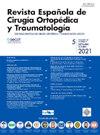Análisis de modelos algorítmicos de aprendizaje automático para la predicción del estado vital a los seis meses tras fractura de cadera en pacientes mayores de 74 años
Q3 Medicine
Revista Espanola de Cirugia Ortopedica y Traumatologia
Pub Date : 2025-01-01
DOI:10.1016/j.recot.2024.05.005
引用次数: 0
Abstract
Background and objective
The objective is to develop a model that predicts vital status six months after fracture as accurately as possible. For this purpose we will use five different data sources obtained through the National Hip Fracture Registry, the Health Management Unit and the Economic Management Department.
Material and methods
The study population is a cohort of patients over 74 years of age who suffered a hip fracture between May 2020 and December 2022. A warehouse is created from five different data sources with the necessary variables. An analysis of missing values and outliers as well as unbalanced classes of the target variable («vital status») is performed. Fourteen different algorithmic models are trained with the training. The model with the best performance is selected and a fine tuning is performed. Finally, the performance of the selected model is analyzed with test data.
Results
A data warehouse is created with 502 patients and 144 variables. The best performing model is Linear Regression. Sixteen of the 24 cases of deceased patients are classified as live, and 14 live patients are classified as deceased. A sensitivity of 31%, an accuracy of 34% and an area under the curve of 0.65 is achieved.
Conclusions
We have not been able to generate a model for the prediction of six-month survival in the current cohort. However, we believe that the method used for the generation of algorithms based on machine learning can serve as a reference for future works.
分析机器学习算法模型,以预测 74 岁以上髋部骨折患者六个月后的生命体征状况。
背景和目的:目的是建立一个模型,尽可能准确地预测骨折后六个月的生命状况。为此,我们将使用通过国家髋部骨折登记处、健康管理部门和经济管理部门获得的五个不同数据源:研究对象为 2020 年 5 月至 2022 年 12 月期间髋部骨折的 74 岁以上患者。从五个不同的数据源创建了一个包含必要变量的仓库。对目标变量("生命状态")的缺失值、异常值以及不平衡类进行分析。利用训练结果对 14 种不同的算法模型进行训练。选出性能最佳的模型并进行微调。最后,利用测试数据对所选模型的性能进行分析:结果:创建了一个包含 502 名患者和 144 个变量的数据仓库。性能最好的模型是线性回归模型。24 例死亡患者中有 16 例被归类为存活患者,14 例存活患者被归类为死亡患者。灵敏度为 31%,准确度为 34%,曲线下面积为 0.65:结论:在目前的队列中,我们还无法生成一个预测 6 个月存活率的模型。但我们相信,基于机器学习的算法生成方法可为今后的工作提供参考。
本文章由计算机程序翻译,如有差异,请以英文原文为准。
求助全文
约1分钟内获得全文
求助全文
来源期刊

Revista Espanola de Cirugia Ortopedica y Traumatologia
Medicine-Surgery
CiteScore
1.10
自引率
0.00%
发文量
156
审稿时长
51 weeks
期刊介绍:
Es una magnífica revista para acceder a los mejores artículos de investigación en la especialidad y los casos clínicos de mayor interés. Además, es la Publicación Oficial de la Sociedad, y está incluida en prestigiosos índices de referencia en medicina.
 求助内容:
求助内容: 应助结果提醒方式:
应助结果提醒方式:


